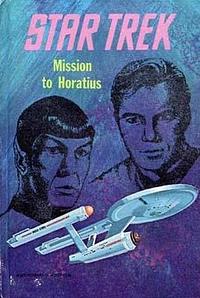Take a photo of a barcode or cover
Nice little short novel. It was written in 1968 as TOS was ending, but seems like it was written much earlier as characterizations are a bit off. This story could have easily been developed into a very in depth novel, but stands fairly well as an entertaining quick read.
The very first original Star Trek book offers a couple hours diversion, though it's clearly written for the youth market (Spock's educational info-dumps, for example). Still, it doesn't excuse an episodic structure that reads like a bad video game script. The characters don't always sound like themselves, Kirk and Chekov in particular, nor are they smart in their decisions (why even consider the stone age planet as a source of the subspace signal, for example). Sulu and Chekov are particularly rash and stupid. But it may be that "space cafard" is causing them to make mistakes. In fact, the scenes of shipboard life aren't bad and make good points about the boredom that must accompany any long journey. The episodes are entertaining enough and usually end with a grievous breach of the Prime Directive (kind of a hoot, actually). So really, it's not as bad as I might have expected.
This is five stars purely because it read EXACTLY like an episode of TOS, and at the end of the day what more could you want? I own this book because the cover is pretty art of Kirk, Spock, and the Enterprise, and I will not be taking criticism at this time.
adventurous
funny
hopeful
mysterious
tense
fast-paced
Plot or Character Driven:
A mix
Strong character development:
No
Loveable characters:
Yes
Diverse cast of characters:
Yes
Flaws of characters a main focus:
No
This is not a good Star Trek book. The Enterprise, with a crew at risk of what’s essentially violent cabin fever, is dispatched to the Horatius system to investigate a distress call. There, they find three planets: one with a stereotypical Native American civilization (“backward savages”, of course), one with a mid-20th century American civilization, and one with space Nazis. Oh, and there’s a “B story” involving a plague-infested rat loose on the ship. So, no, as a Star Trek adventure, there’s not much to recommend it.
However: It’s the _first_ officially licensed Star Trek novel, and therefore gets a bit of leeway…or at least recognition that the treklit landscape was far different (nonexistent, actually) in 1968 than it is today. Not really recommended unless you’re a collector, but if you are and can track it down (especially if you can find an original rather than the 1999 reprint), it’s a quick read and kind of fun to see where the print side of Trek began.
However: It’s the _first_ officially licensed Star Trek novel, and therefore gets a bit of leeway…or at least recognition that the treklit landscape was far different (nonexistent, actually) in 1968 than it is today. Not really recommended unless you’re a collector, but if you are and can track it down (especially if you can find an original rather than the 1999 reprint), it’s a quick read and kind of fun to see where the print side of Trek began.
Mack Reynolds' Mission to Horatius may be the first Star Trek original fiction, but aside from that hallowed ground, it offers very little to a modern reader. First published in 1968 for young audiences, the book takes the crew of the Enterprise to the Horatius system, where they search three separate planets in hopes of uncovering the source of a mysterious subspace distress call. The book wants to tackle a number of different ideas and dangers, including primitivism, religious extremism, Nazism, and even the dangers of deep space on a crew's psyche, but it somehow manages to do none of them well.
The problem of the book is its inability to focus on any one particular issue with any kind of real philosophical weight. The book opens and closes on a problem of "space cafard," which Bones says is a dangerous degenerative mental disease that will cause the crew to rip themselves apart. It speeds along to three separate planets, each presenting a problematic view of the human past, but the closing thoughts on the novel don't do much of anything for either characters or for the audience. The book is rife with cliché, barely ever scratching even the surface of the ways in which the book could present real philosophical questions with an actual weight.
The fact that the book never tries to do more than a surface-level read of the problems each society might present in conflict with the Federation is not its only sin, either. In its characterization of the people of Neolithia, for example, the book relies on an extraordinarily hurtful depiction drawing from stereotyped Native American culture. It presents otherwise weak criticisms of Nazism without doing much to present the terrors of actual Nazism, as well as an even more bland criticism of the Catholic Church. Neither of these two criticisms are remotely as offensive, but it's still disappointing to see the book refuse to grapple with the weight of these two systems of governance, either.
There's also the way in which the book simply ignores its own social or political repercussions for the actions of the crew. For example, the crew frequently encounter conflicting notions with regards to General Order Number One (later known as the Prime Directive), constantly fretting that they can't interfere with the societies they inhabit, yet on two occasions assist in a total overthrow of the system of governance on these colonies. These could be interesting story beats, but they're never treated with any seriousness, and the story as a result never sees the conflict come to fruition as anything more than a talking point for the plot.
Many apologists for the book will likely look to its age and suggest that its young audience, coupled with the social attitudes of the time, answer for the book's inconsistencies and its problems. But Star Trek as a program showed that progressive science fiction could be meaningful and entertaining, and the fact that this book, even if aimed at a young audience, fails to engage in meaningful dialogue about any of its problems is very frustrating.
I don't believe Star Trek fiction to be nearly so disposable or as uneven as tie-in fiction from other franchises (say, Star Wars), but this book doesn't offer much for modern readers. With such a wealth of other Star Trek fiction out there, maybe this one is better left behind.
The problem of the book is its inability to focus on any one particular issue with any kind of real philosophical weight. The book opens and closes on a problem of "space cafard," which Bones says is a dangerous degenerative mental disease that will cause the crew to rip themselves apart. It speeds along to three separate planets, each presenting a problematic view of the human past, but the closing thoughts on the novel don't do much of anything for either characters or for the audience. The book is rife with cliché, barely ever scratching even the surface of the ways in which the book could present real philosophical questions with an actual weight.
The fact that the book never tries to do more than a surface-level read of the problems each society might present in conflict with the Federation is not its only sin, either. In its characterization of the people of Neolithia, for example, the book relies on an extraordinarily hurtful depiction drawing from stereotyped Native American culture. It presents otherwise weak criticisms of Nazism without doing much to present the terrors of actual Nazism, as well as an even more bland criticism of the Catholic Church. Neither of these two criticisms are remotely as offensive, but it's still disappointing to see the book refuse to grapple with the weight of these two systems of governance, either.
There's also the way in which the book simply ignores its own social or political repercussions for the actions of the crew. For example, the crew frequently encounter conflicting notions with regards to General Order Number One (later known as the Prime Directive), constantly fretting that they can't interfere with the societies they inhabit, yet on two occasions assist in a total overthrow of the system of governance on these colonies. These could be interesting story beats, but they're never treated with any seriousness, and the story as a result never sees the conflict come to fruition as anything more than a talking point for the plot.
Many apologists for the book will likely look to its age and suggest that its young audience, coupled with the social attitudes of the time, answer for the book's inconsistencies and its problems. But Star Trek as a program showed that progressive science fiction could be meaningful and entertaining, and the fact that this book, even if aimed at a young audience, fails to engage in meaningful dialogue about any of its problems is very frustrating.
I don't believe Star Trek fiction to be nearly so disposable or as uneven as tie-in fiction from other franchises (say, Star Wars), but this book doesn't offer much for modern readers. With such a wealth of other Star Trek fiction out there, maybe this one is better left behind.
The Mickey the space rat subplot unironically saved this novel for me.
Somehow I missed reading this book, the first Star Trek novel, by veteran science fiction author Mack Reynolds. While not a shining example of Trek lit, the oddities are amusing. I've also read all the early Star Trek novels published by Pocket Books. I think Reynolds only had a few episodes to guide him, but his work is no worse than the Pocket Star Trek tales that came later and in some ways, I think he had a better understanding of the characters.
adventurous
funny
lighthearted
medium-paced
Plot or Character Driven:
A mix
Loveable characters:
Yes
Diverse cast of characters:
Yes
Interesting for the history. Couldn't *stand* the writing style.







